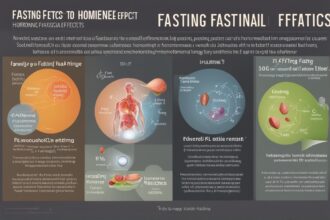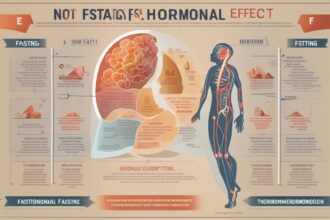Have you ever wondered how fasting impacts your body on a deeper level, beyond just skipping a meal or two? When it comes to hormones and fasting, there’s a fascinating interplay at work that can influence everything from your energy levels to your weight management goals. Fasting isn’t just about cutting calories; it’s a powerful tool that can shift your hormonal balance, potentially leading to improved health and well-being. In this post, we’ll dive into the science behind fasting and hormones, explore how these changes affect your body, and provide practical tips to optimize your fasting journey. Whether you’re a seasoned faster or just curious about intermittent fasting, let’s uncover how your body’s chemical messengers respond to this ancient practice.
What Are Hormones, and Why Do They Matter During Fasting?
Hormones are your body’s chemical messengers, regulating everything from metabolism and appetite to mood and energy. When you fast, whether it’s for 16 hours or several days, your body undergoes significant shifts in hormonal activity. These shifts are often a response to the absence of food, as your system works to maintain energy balance and tap into stored resources. Understanding the connection between hormones and fasting is key to appreciating why fasting can be such a transformative health practice. Hormones like insulin, ghrelin, and cortisol play starring roles during fasting, and their behavior can determine whether you feel energized or sluggish, hungry or satisfied.
Insulin: The Blood Sugar Regulator
One of the most significant hormonal changes during fasting involves insulin, the hormone responsible for managing blood sugar levels. When you eat, insulin spikes to help cells absorb glucose for energy or storage. During fasting, with no incoming food, insulin levels drop dramatically. This reduction allows your body to switch from burning glucose to accessing stored fat for fuel—a process central to the benefits of fasting and metabolism. Lower insulin levels also improve insulin sensitivity over time, which is crucial for preventing conditions like type 2 diabetes. Research shows that intermittent fasting can reduce insulin resistance, making your body more efficient at handling blood sugar.
Ghrelin and Leptin: The Hunger and Fullness Duo
Ever notice how hunger seems to ebb and flow during a fast? That’s the work of ghrelin, often called the “hunger hormone,” and leptin, which signals fullness. When you start fasting, ghrelin levels initially rise, making you feel hungry as your body signals the need for food. However, studies suggest that over time—especially during extended fasts—ghrelin levels can stabilize or even decrease, reducing hunger pangs. On the flip side, leptin levels may drop during fasting due to reduced fat mass or energy intake, which can temporarily affect feelings of satiety. Balancing these hormones during fasting is a natural process, but it explains why some people find fasting challenging at first while others adapt quickly.
- Start with shorter fasting windows (like 12:12) to let your body adjust to hunger cues.
- Stay hydrated—water can help suppress false hunger signals from ghrelin.
- Eat nutrient-dense meals during eating windows to support leptin balance.
- Be patient; hunger often subsides as your body adapts to fasting routines.
Cortisol and Stress: Finding the Balance
Cortisol, the stress hormone, also plays a role in how your body responds to fasting. During short-term fasting, cortisol levels may rise as part of the body’s “fight or flight” response to perceived stress (i.e., lack of food). This increase helps mobilize energy by breaking down fat and protein stores. While this can be beneficial for energy production, chronically elevated cortisol from prolonged fasting or poor lifestyle habits can lead to fatigue, irritability, or even weight gain. The key with fasting and stress hormones is moderation—don’t push your body beyond its limits. Combining fasting with stress-reducing practices can help keep cortisol in check and maximize the hormonal benefits of your fast.
Human Growth Hormone (HGH): The Repair and Recovery Booster
One of the lesser-known but exciting effects of fasting is its impact on Human Growth Hormone (HGH), which supports tissue repair, muscle growth, and overall recovery. Studies have shown that fasting can increase HGH levels significantly—sometimes by as much as fivefold during a 24-hour fast. This surge helps your body repair cells, build muscle, and even combat aging. For those interested in fasting for hormonal health, this boost in HGH is a major perk, especially if you’re pairing fasting with exercise. However, the increase is temporary and tied to the fasting state, so consistency in your routine matters to reap long-term benefits.
- Try fasting for at least 16–18 hours to trigger a notable HGH increase.
- Pair fasting with light exercise like walking to enhance HGH release without over-stressing your body.
- Avoid overeating post-fast, as high insulin can suppress HGH levels.
- Ensure adequate sleep—HGH production peaks during deep rest, complementing fasting benefits.
- Consult a healthcare provider if you have underlying conditions affecting hormone levels.
Practical Tips to Optimize Hormonal Balance While Fasting
While the science behind hormones and fasting is compelling, the real magic happens when you apply this knowledge to your daily routine. Fasting can be a powerful tool for hormonal health, but it’s not a one-size-fits-all solution. Your body’s response depends on factors like stress levels, sleep quality, and overall nutrition. To make the most of fasting’s hormonal effects, start slow and listen to your body. If you’re new to fasting, jumping into a 24-hour fast might spike cortisol and leave you feeling drained. Instead, ease into it with shorter windows and focus on supporting your hormones with a balanced lifestyle. Remember, fasting is a tool—not a punishment—so tailor it to your needs for sustainable results.
In conclusion, the relationship between hormones and fasting reveals just how dynamic and adaptive our bodies are. From insulin’s role in fat burning to HGH’s boost for recovery, fasting triggers a cascade of hormonal changes that can enhance your health when done thoughtfully. By understanding how fasting impacts hormones like ghrelin, leptin, and cortisol, you can better navigate hunger, stress, and energy fluctuations. Start with small, manageable fasting windows, prioritize hydration and sleep, and don’t hesitate to seek guidance if you’re unsure about your approach. Ultimately, fasting offers a unique opportunity to reset and rebalance your hormonal system—potentially unlocking a healthier, more energized version of yourself. So, are you ready to experiment with fasting and see how your hormones respond? Let us know your experiences in the comments below!






